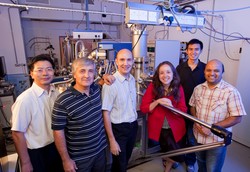Nov 22 2010
Singapore’s A*STAR participates in groundbreaking European Union (EU) project to jointly create a processor that is the size of a molecule.
A*STAR’s Institute of Materials Research and Engineering (IMRE) partners 10 EU research organisations to work on the groundbreaking €10 million ATMOL project that lays the foundation for creating and testing a molecular-sized processor chip.
 Prof Christian Joachim (second from left) and some the Atom Technology team
Prof Christian Joachim (second from left) and some the Atom Technology team
A*STAR’s IMRE and 10 EU research organisations are working together to build what is essentially a single molecule processor chip. As a comparison, a thousand of such molecular chips could fit into one of today’s microchips, the core device that determines computational speed. The ambitious project, termed Atomic Scale and Single Molecule Logic Gate Technologies (ATMOL), will establish a new process for making a complete molecular chip. This means that computing power can be increased significantly but take up only a small fraction of the space that is required by today’s standards.
The fabrication process involves the use of three unique ultra high vacuum (UHV) atomic scale interconnection machines which build the chip atom-by-atom. These machines physically move atoms into place one at a time at cryogenic temperatures. One of these machines is located in A*STAR’s IMRE.
“IMRE holds the only patent in the world for making solid interconnections and packaging of a molecular chip”, says Prof Christian Joachim, who is leading the entire project, explaining the reason A*STAR’s IMRE was chosen as a partner in this groundbreaking project.
“The UHV interconnection machine at IMRE is the only one in the entire project that can study the performance of a single molecule logic gate and surface atom circuit logic gate at the moment”, added Prof Joachim, who is the Head of Molecular Nanoscience and Picotechnology at the French Centre National de la Recherche Scientifique (CNRS), and a Visiting Investigator at IMRE. Prof Joachim’s team in IMRE is one of the pioneers in atom technology, having built the world’s first controllable molecular gear.
“The work in this project is extremely important in setting the stage for how computer chips and electronics may be made in the future”, said Prof Andy Hor, Executive Director of IMRE. “The fact that we are the only non-EU research organisation in this project speaks volumes about the level of Singapore’s research and how far we have come in building our R&D capabilities”.
According to Dr. David Guedj, the European Officer following ATMOL for The European Commission, “ATMOL is the flagship project coming out of the recent Call for Proposals on Molecular Scale Devices and Systems". It was launched by the Future and Emerging Technologies (FET-Proactive) part of the Information and Communication Technologies (ICT) programme of the European Commission. FET-Proactive supports transformational, long-term collaborative frontier research in Europe, with a view to develop scientific excellence and technological innovation.
Source: http://www.a-star.edu.sg/